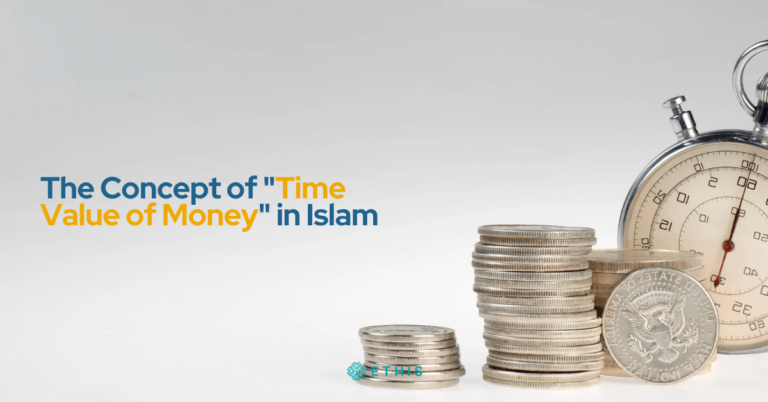
Time value of money originates from the concept of interest (riba) and has a significant global impact on consumers, businesses as well as governments. In Islam, time value of money is viewed very differently to the mainstream economic system.
There are a few crucial differences between the conventional monetary valuation of time and the Islamic monetary valuation of time:
According to the conventional perspective, time value of money is the reason for charging interest on capital. However, in Islam, profit on the trade of goods or providing services forms the basis of earning a profit.
Time value of money under the conventional perspective is not based on profit and loss sharing because interest is charged on funds borrowed even in cases where the business suffers losses. However, Islamic banks operate based on profit and loss sharing. If the business person has suffered losses, the bank will share these losses based on the mode of finance used (e.g Mudharaba, Musharakah).
Related: Buy Now Pay Later (BNPL): Shariah Compliant?


From a conventional perspective, besides being a medium of exchange and store of value, money is regarded as a commodity. It can therefore be sold for a price higher than its nominal value and can also be rented out. In Islam, money is used both as a medium of exchange and store of value although it is not regarded as a commodity. It cannot therefore be sold at a price higher than its nominal value and also cannot be rented out.
The practice of money as being a commodity ultimately leads to inflation. Contrastingly, with Islamic banking, by using activities related to trade, a link is formed between sectors in the economic system. This means that since money is linked to physical assets, it contributes directly to the development of the economy.
Money itself has no intrinsic value (has no value within itself) whereas a commodity has an intrinsic function and thus can be utilised directly. Commodities have different qualities but the main quality of money is that it is a measure of value or medium of exchange. It should not be allowed to give rise to more money (via fixed interest payments).
According to Shariah law, money is not permitted to be the subject of trade like other commodities. If money has to be exchanged for money, or if it has to be loaned (for exceptional reasons), the payment on both sides must be equal. This is to ensure that the money is not used for the incorrect intention (i.e usury or trading in money itself).



Money is treated as capital only when it is used alongside other resources to undertake productive activities. Islam recognises money’s time value only when it acts as capital and not when it is in a state of prospective capital.
Related: Here’s 3 things non-Muslims need to know about Islamic Finance
With regards to the permissibility of sale on credit, Allah (ﷻ) says in the Holy Quran,
“Allah has permitted trade and forbidden riba” [Al-Baqarah, 275]
“O you who believe, when you deal with each other in transactions, involving future obligations in a fixed period of time, record them in writing. [Al-Baqarah, 282]
Ayesha reported that the Prophet (ﷺ) bought some foodstuff on credit from a Jewish trader and mortgaged his armor to him [Bukhari and Muslim].
There is agreement amongst scholars on the permissibility of selling on credit if the due date is known and there is also unanimous agreement with regards to the permissibility of increasing the prices of a sale on credit:
“The price may be increased based on deferment”. Al Kasani [Hanafi]
“Time has been given a share in the price” Ibne Rush [Maliki]
“Deferment earns a portion of the price” Al Nawawi [Shafi’i]
“Deferment takes share of the price” Ibne Taymiyah [Hanbali]
Shariah acknowledges the concept of money’s time value to the extent of the pricing in a credit sale. It does not approve of placing “rent” on money loans as is done by interest in credit and loans.


In a sale transaction, the monetary valuation of time is therefore accepted as being valid under traditional jurisprudence. These are interpreted as price differentials that compensate for the delay in fulfilling a party’s contractual obligation or for the opportunity cost of the money used by a contractual party in providing goods.
In a lending transaction, the monetary valuation of time is not recognised in Islam as it is a loan for deferral built on money’s time value. It is intended to benefit the moneylender. Islam only permits a Qard e Hassan loan (benevolent / interest-free loan).
Therefore time value is possible only upon the trade of commodities and not when exchanging monetary values and loans or debts. This implies that while time value is acceptable in the case of pricing assets and their usufruct, it is not acceptable in the case of any additional value to the principal of loans or debts.
Related: What are the Islamic Viewpoints of Growing Wealth and Investing?





Top Posts
Islamic P2P Crowdfunding Explained
Halal Money Matters: How Muslims Can Balance Deen and Dunya with Smart Islamic Finance
Halal Investments for Singapore Muslims? It’s time for a shake-up in the Islamic Investments scene.
Smart investment for making Halal money
3 Reasons Why Property Crowdfunding is the Smart Investment for You